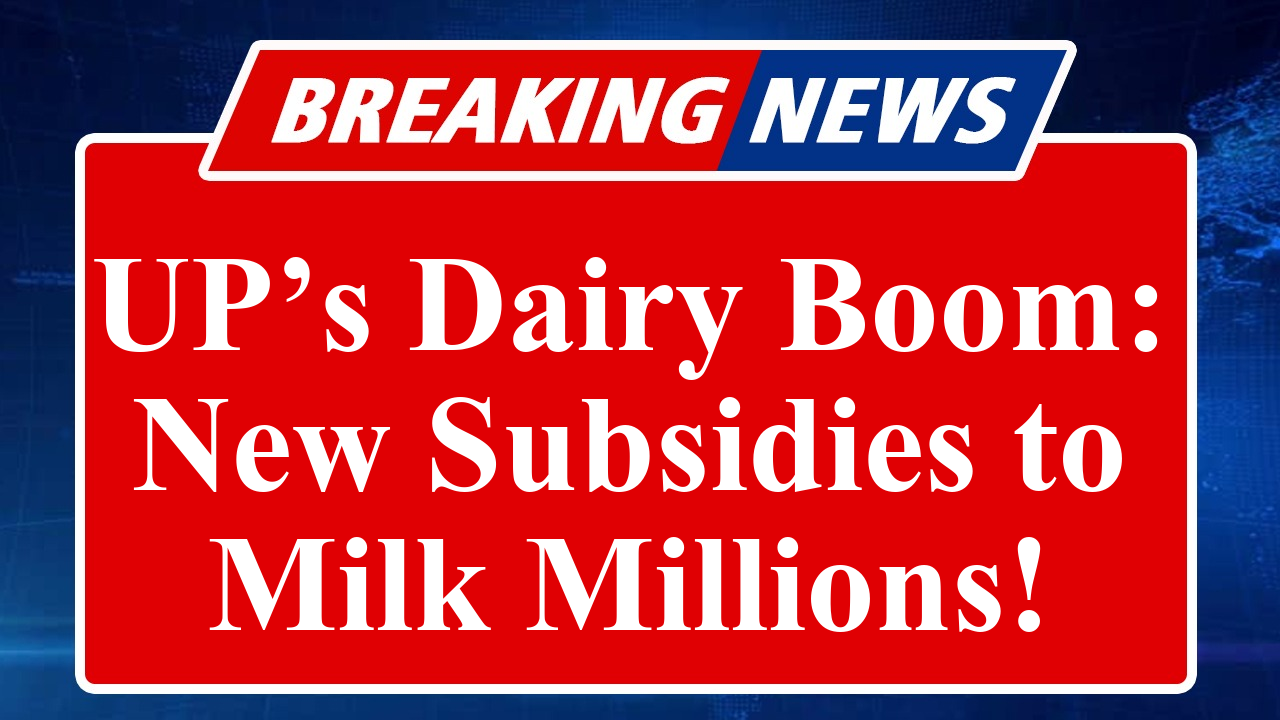“The Uttar Pradesh government has launched new subsidies under the Dairy Development Policy 2022 to strengthen milk cooperatives, offering capital and interest subsidies for dairy units, cattle feed plants, and technological upgrades. Aimed at boosting milk production and farmer incomes, the initiative includes training and infrastructure support to make UP a dairy powerhouse.”
UP’s Bold Push to Empower Dairy Cooperatives with New Subsidies
The Uttar Pradesh government has rolled out a series of subsidies under the Dairy Development Policy 2022 to bolster the state’s dairy sector, focusing on milk cooperatives and farmer-led enterprises. Announced as part of the state’s broader vision to transform Uttar Pradesh into a leading investment destination, these measures aim to enhance milk production, improve infrastructure, and uplift the livelihoods of dairy farmers.
A key component of the policy is a 10% capital subsidy, capped at ₹5 crore, for establishing new dairy units, including machinery, technical civil works, and spare parts. This subsidy extends to milk processing and manufacturing units, encouraging cooperatives to modernize and scale operations. Additionally, an interest subsidy of 5% or the actual loan amount (whichever is lower) is available for five years, with a ceiling of ₹10 crore for dairy processing units and ₹7.5 crore for cattle feed and nutritional feed units. Technological upgrades, such as quality control equipment and traceability systems, are also supported with an interest subsidy capped at ₹2.5 crore for five years.
The policy emphasizes training to enhance the skills of dairy farmers and professionals. The state government has partnered with renowned institutes to provide training on clean milk production, breed improvement, and technical and financial aspects of dairy management. This initiative targets Micro, Small, and Medium Enterprises (MSMEs), Farmer Producer Organizations (FPOs), and Milk Producer Companies, ensuring a broad reach across the dairy ecosystem. The reform of the Regional Cooperative Dairy Federation Limited (PCDFL) is also underway to streamline operations and improve efficiency.
To support infrastructure development, the policy includes provisions for integrating advanced technologies like Supervisory Control and Data Acquisition (SCADA) systems for better traceability and information management. A dedicated portal and database management system, along with a Project Facilitation Centre, will assist cooperatives in navigating the subsidy application process and accessing resources. The Uttar Pradesh government is also offering stamp duty subsidies and support from the electricity department for new dairy milk units, further reducing the financial burden on cooperatives.
These subsidies align with the state’s goal of increasing milk production to meet growing demand and strengthen the rural economy. Uttar Pradesh, already a significant contributor to India’s milk production, aims to leverage its cooperative model to empower small and marginal farmers. The state’s dairy sector is poised for growth, with investments in chilling units, milk collection centers, and processing facilities expected to enhance supply chain efficiency.
The policy also dovetails with national initiatives like the National Programme for Dairy Development (NPDD) 2.0, which focuses on increasing milk procurement by 50% over the next five years. By strengthening dairy infrastructure and promoting financial inclusion through cooperative banks, Uttar Pradesh is positioning itself as a leader in India’s dairy revolution. The state’s efforts are expected to benefit millions of farmers, particularly women, who form a significant portion of dairy cooperative participants.
Disclaimer: This article is based on information from government announcements, official websites like Invest UP, and recent reports on dairy development in India. Data is sourced from credible outlets such as Hindustan Times, The Economic Times, and government portals like dahd.gov.in. Readers are advised to verify subsidy details with local authorities or implementing agencies for specific eligibility and application processes.

